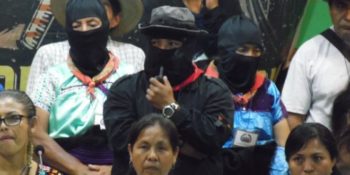
Comunicados EZLN

(Español) Comunicado del Concejo Autónomo del Pueblo de San Luis Tlaxialtemalco. 21 de octubre del 2019
Comunicado del Concejo Autónomo del Pueblo de San Luis Tlaxialtemalco. 21 de octubre del 2019
Por órdenes de José Carlos Acosta Ruiz, Alcalde Xochimilco, y Abraham Morales, Director de Participación Ciudadana, el día de hoy aproximadamente a las 09:00 horas fueron cerradas de forma arbitraria e ilegal las instalaciones del edificio de la Coordinación Territorial del pueblo.
El Concejo agotará las instancias legales correspondientes, ya que con esta medida se priva al pueblo de la realización de distintos servicios y trámites, además de que, por mandato de la asamblea del día de ayer, y como consecuencia de la resolución del Tribunal Electoral, el Concejo electo asume las funciones que tenía el anterior cargo de Coordinador Territorial.
Con esta medida, las autoridades de la Alcaldía se niegan a permitir la organización y el desarrollo de nuestro pueblo, por lo que hacemos un llamado a establecer el diálogo y ordenar la apertura inmediata.
A pesar de lo anterior, desde el día de hoy el Concejo estará trabajando por el bienestar del pueblo, con la convicción de servir a la comunidad.*
Les pedimos estar atentos a cualquier convocatoria a la asamblea del pueblo, a fin de determinar las acciones a seguir.
*Recordamos que nuestro cargo siempre será honorífico, y como ya no existe el cargo de Coordinador Territorial, no recibiremos ningún sueldo de la Alcaldía ni de nadie.
ENTREGA-RECEPCION DE LA SOLIDARIDAD NACIONAL E INTERNACIONAL DE LAS REDES DE APOYO AL CNI-CIG A LOS PUEBLOS EN RESISTENCIA DEL CIPOG-EZ.
Comunidad de Xolotepec, Chilapa de Álvarez, Gro. 24 de Agosto del 2019.
ASUNTO: ENTREGA-RECEPCION DE LA SOLIDARIDAD NACIONAL E INTERNACIONAL DE LAS REDES DE APOYO AL CNI-CIG A LOS PUEBLOS EN RESISTENCIA DEL CIPOG-EZ.
REDES DE APOYO AL CNI-CIG, SEXTA NACIONAL E INTERNACIONAL, PUEBLOS DEL CNI-CIG, HERMANOS ZAPATISTAS DEL EZLN.
PRESENTES.
Reciban un abrazo de los hombres, mujeres, niños y abuelitos de los pueblos Nahua de la montaña baja de Guerrero, que conformamos el Concejo Indígena y Popular de Guerrero Emiliano – Zapata. Desde el corazón de la resistencia les damos las gracias por el apoyo solidario que hoy llega a nuestras comunidades y pueblos que continúan asediados por los grupos narco-paramilitares, que tantas vidas ya nos han arrebatado.
A la cuenta pública que el CNI-CIG abrió, llego la solidaridad nacional e internacional que vendiendo tamales, haciendo fiestas, con música, con artes y sobre todo con el corazón hiso llegar la cantidad de $ 283,336.10. Con lo cual se logró materializar una de nuestras demandas que desde hace cinco años hemos exigido al gobierno estatal de Guerrero y siempre nos negó. Ahora es una realidad el sistema de comunicación comunitaria que se ha instalado en nuestro territorio y que consta en este momento de la torre, las celdas solares, la repetidora y las radios portátiles que en este momento están beneficiando a las 22 comunidades que continuamos en el CIPOG-EZ
Sabemos que sus corazones están resistiendo con los nuestros, y que lamentablemente no se pudo hacer esa caravana para abrazar nuestras resistencias, sabemos también que los malos gobiernos están mintiendo a los organismos nacionales e internacionales de derechos humanos, les dicen que ellos están garantizando nuestra seguridad y es mentira, tan solo basta ver cuantos asesinatos y secuestros continúan en nuestro municipio y nuestro territorio.
La justicia no llegara de arriba, ni mucho menos de los guardianes de los intereses de los poderosos, por eso agradecemos que los nombres, rostros e historias de nuestros hermanos caídos los han dado a conocer alrededor del mundo. No los dejemos morir en el olvido, sigamos haciendo la justicia de los pueblos y que la lucha de nuestro concejal Lucio Bartolo y nuestros hermanos caídos retumbe en todos los rincones del mundo.
Desde el corazón de la resistencia de los pueblos Nahua de la región Montaña-Baja reiteramos nuestro agradecimiento a la solidaridad que hoy recibimos, y les reiteramos que nosotros no nos vendemos, no nos rendimos y no vamos a dejar de luchar. Respetamos y saludamos sus luchas, resistencias y rebeldías en nuestro territorio seguiremos defendiendo la vida y sabemos bien, que más temprano que tarde podremos encontrarnos y que no habrá barrera de miedo que pueda vencernos. También les pedimos que para comunicarse con nosotros y evitar malos entendidos lo hagan a través de nuestros medios de comunicación que junto con nuestra Radio Zapata, van avanzando poco a poco: territorio.cipog.ez@gmail.com y www.cipogez.wordpres.com.
¡Justicia para José Lucio Bartolo Faustino, Modesto Verales Sebastián, Bartolo Hilario Morales, Isaías Xanteco Ahuejote, David Domingo Alonso, Marcelino Pedro Rojas, Juana Hernández Ambrosio y Alberta Matías Tendón, integrantes del CIPOG-EZ y el CNI-CIG!




